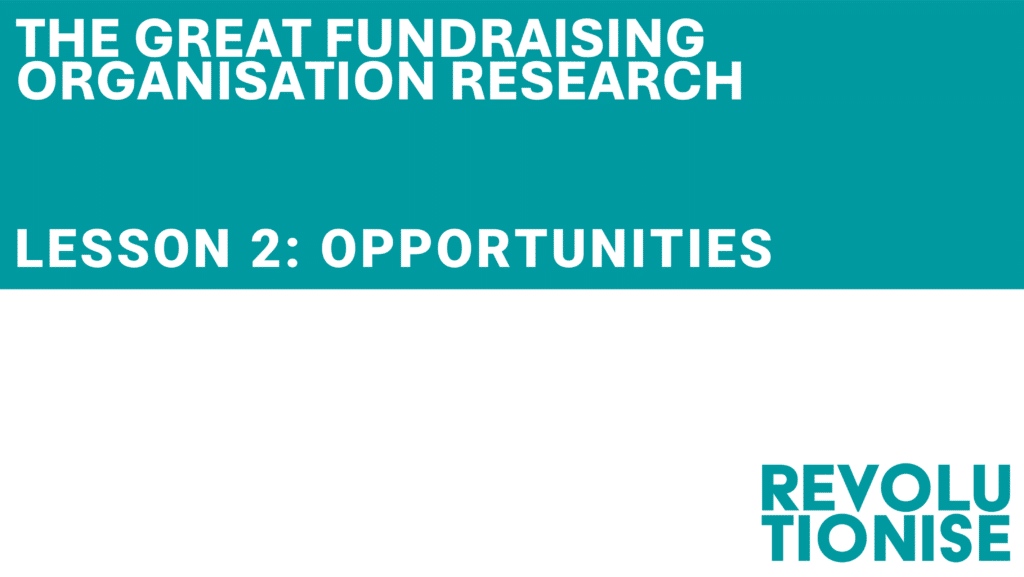By Maree Daniels, Revolutionise
Hopefully you caught our last Benchmarking Project blog on the Great Fundraising research (if you missed it, please check it out here) where we started a look into key insights about organisational culture and the first of five areas of behaviour that differentiates organisations who are achieving fundraising growth and those who aren’t.
These key insights come out of the Great Fundraising Research Report (you can download it for free here).
In the first article we discussed the pillar of ‘money’. This time we will look at ‘opportunities’.
The Benchmarking Project’s data will help you identify where your opportunities lie compared to the market. However, have you considered how your organisation’s culture can significantly impact your ability to maximise these opportunities?
With this in mind, ask yourself:
Does my organisation support a scientific culture?
Does my organisation truly embrace a learning culture?
In the organisations studied, they took a scientific approach to creating and evaluating every opportunity. They operated under a scientific culture.
A culture where there is rigour around testing a portfolio of hypotheses. They were not looking for just one big idea. These organisations tested and measured their fundraising ideas, learned from these tests, and applied the learnings for more refined testing.
Of course, the more tests you have the more risk there is, but also more opportunity.
Secondly, they upheld a ‘learning culture’ as opposed to a ‘certainty culture’.
The board or leadership in a ‘certainty culture’ have a mindset of ‘we will only invest if you can guarantee a return’ (preferably within 12 months so not to affect our budgeting and cash flow!).
In a certainty culture there is no room for failure or learning.
A key differentiating behaviour for organisations that achieved fundraising growth is the board and leadership supported a ‘learning culture’. A culture where testing is essential and they will invest so long as the outcomes are scientifically measured to help fundraising learn and improve.
In a true learning culture, not everything succeeds. If it did, then you are likely to not learn much! If every test succeeds, then you are not innovating or testing the boundaries of the market.
In a certainty culture there is no room for failure or learning. In a learning culture there is no failed tests because the purpose of a test is to learn.
Excellent record keeping and data management is essential for scientific testing. Applying knowledge from your benchmarking data is also a key tool. Some Benchmarking Project members have used metrics from benchmarking data to establish targets for their testing.
But as the research shows, getting the organisational culture right is also critical to the fundraising success and organisational growth (*refer back to lesson one where we discussed the culture and understanding amongst leadership of long-term investment driven fundraising).
Your benchmarking data can help develop a test and learn culture by educating internally and building understanding in a test and learn culture that is backed by metrics.
Of course, we are not suggesting rushing out and investing the entire organisations reserves in one test.
Invest most in what you are confident in and know will work. But there should be a sensible and relative budget (relative to the size of the organisation and financial position) that is used for testing which has no income expectation demanded of it.
Stay tuned for lesson three coming soon! In the meantime, please don’t hesitate to reach out to Maree Daniels at maree.daniels@revolutionise.com if you would like to discuss the ‘Great Fundraising’ research further.

